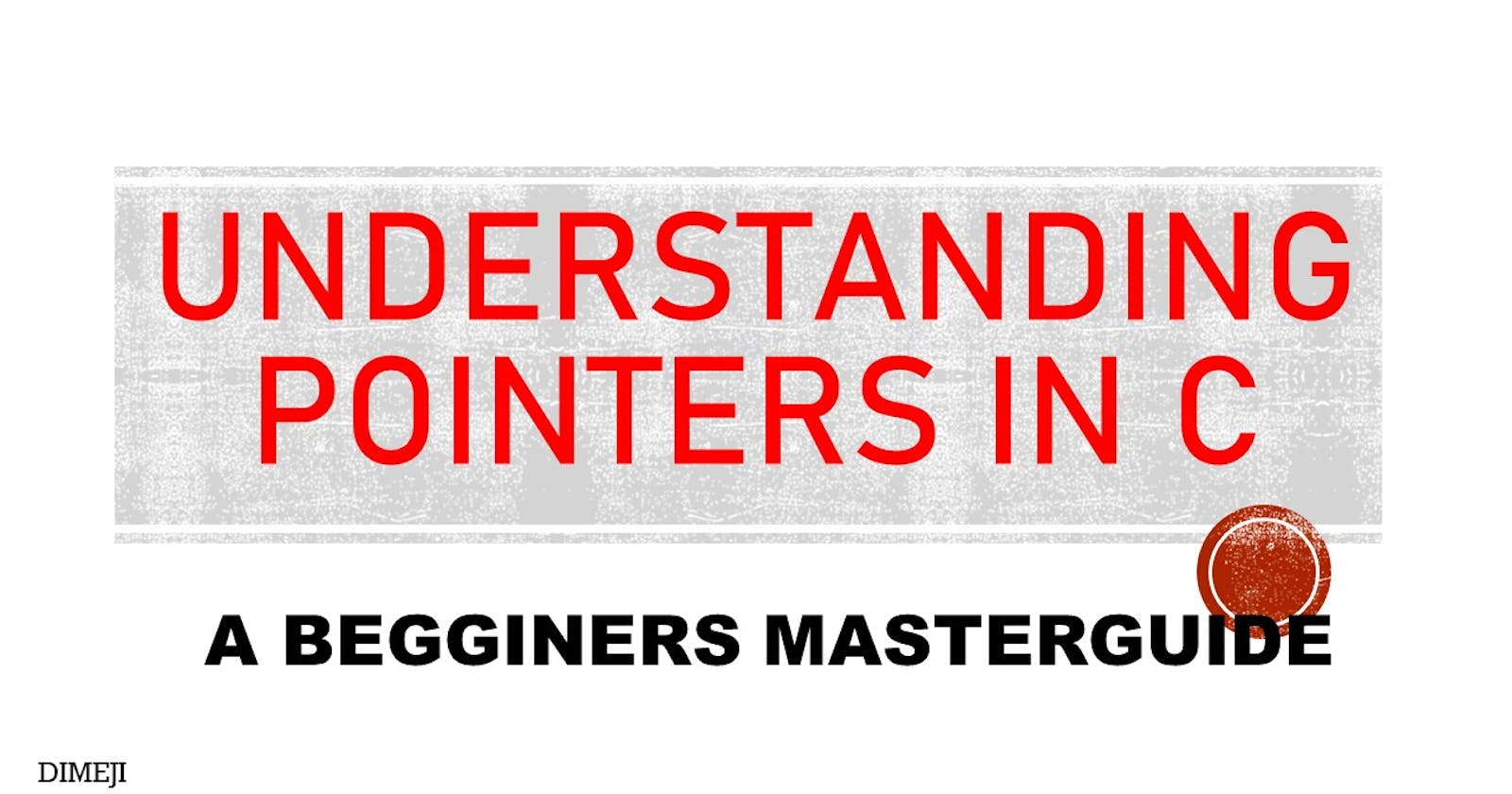A Beginner's Guide to Pointers in C: Understanding and Application
Introducing the C programming language
The C language was developed in 1972 at At&T Bell Labs by Dennis Ritchie. It combines features of the B and BCPL (Basic Combined Programming Language) programming languages but is also mixed with the Pascal language. C was used to create the Unix operating system.
Pointers in C
Pointers are one of the fundamental and toughest concepts to grasp in the C programming language. Even experienced programmers still have issues with it, but in this article, we will demystify and break it into bits so that even a toddler will be able to grasp the concept.
A pointer is a variable that holds the address of another variable. A variable is a datatype in C; examples of variables are int, char, double, float, etc., while the address is the memory location on a computer where it is stored. Just imagine you are going to Mr. A’s house, but instead of going straight to his house, you decide to first visit Mr. B’s house since he holds the address of Mr. A’s house.
Pointers Declaration
Pointers are declared using the dereference operator (*)
Datatype *ptr
int *ptr
char *ptr
float *ptr
double *ptr
void *ptr
it can also be written as datatype* ptr
Initialization of Pointers
Pointers are initialized using the address-of-operator, also called the ampersand (&). Let us use a code example to show the initialization of pointers.
#include <stdio.h>
int main()
{
int a = 20; //declaration of a int variable
int *ptr; //declaration of a pointer variable
ptr = &a; //initializing ptr, ptr now holds the address of a
printf("the address of p is %p\n", ptr);
printf("the address of a is %p\n", &a);
return (0);
}
When you run and compile this code, you will see that the addresses of a and ptr are the same.
Pointer Arithmetic
The only arithmetic that can be done with a pointer is addition and subtraction.
that is incrementing and decrementing a pointer. To explain this again, let's see a simple code example.
int main()
{
int array[] = {1, 2, 3, 4, 5}; // declaration of an array
int *p; //declaring a pointer p
p = &array;
printf("the first element is %d\n", *p); // 1 is printed
printf("the second element is %d\n", *(p + 1)); // 2 is printed
printf("the third element is %d\n", *(p + 2)); // 3 is printed
//lets now look at incrementing and decrementing
p++;
printf(" after incrementing %d\n", *p); // 2 is printed
p--;
printf(" after decrementing %d\n", *p); // 1 is printed
}
Run and compile the code to test it out.
Note: A void pointer cannot be incremented, decremented, or dereferenced.
Pointers and Arrays
Pointers and arrays share a close relationship in C. In fact, arrays can be accessed and manipulated using pointers, and vice versa.
#include <stdio.h>
int main()
{
int arr[] = {1, 2, 3, 4, 5, 6};
int* p; //dont fret it is still the same as int *p
p = &arr;
printf("Using pointer to print the element of the array");
printf("the first element is %d"\n, *p); //it can also be written as *(p + 0)
printf("the second element is %d\n", *(p + 1)); // 2 is printed
printf("the third element is %d\n", *(p + 2)); // 3 is printed
return (0);
}
To print all the elements of the array, we can follow these simple code implementations.
#include <stdio.h>
int main()
{
int arr[] = {1, 2, 3, 4, 5, 6}
int* p; //dont fret it is still the same as int *p
p = &arr; //initializing the pointer
int i; // to iterate through the array
for (i = 0; i < 5; i++)
{
printf("Element %d = %d", i, *(p + i));
ptr++; //move to the next element
}
return (0);
}
Pointers and memory allocation
Pointers are a very important concept when dealing with memory allocation in C programming. Functions like malloc, calloc, realloc, and free enable programmers to allocate memory for a program. We will need a pointer to easily allocate memory. To fully understand how it works, let's see a code example.
int size = 5;
int *ptr;
ptr =(int *)malloc(size * sizeof(int)) // we have allocated memory to ptr
free(ptr);
Memory allocation is not within the scope of this article; you can follow me so you won't miss out when I drop the article on memory allocation.
Pointers and structures
Pointers can also be used with structures to manipulate members of the
structure effectively.
struct test{
int a;
int b;
}
struct test test1;
struct test *ptr;
ptr = &test1;
ptr->a = 1;
ptr->b = 2;
printf("a and b are %d & %d\n", test1.a, test1.b);
Pointers with Functions (function pointers)
Pointers can also be used with functions to easily manipulate multiple functions in C programming.
int add(int a, int b) {
return a + b;
}
int subtract(int a, int b) {
return a - b;
}
int main() {
int (*operation)(int, int);
// Initializing function pointer with the 'add' function
operation = &add;
printf("Result: %d\n", operation(5, 3));
// Reassigning the function pointer to the 'subtract' function
operation = &subtract;
printf("Result: %d\n", operation(5, 3));
return 0;
}
Pointers are very effective as they hold the address of a variable.
Other examples of pointers are:
Null pointer
Dangling pointer
Far pointer
Wild pointer
Merits of using pointers
pointers enable us to efficiently allocate memory
they provide direct memory access
pointers can be used for efficient array manipulation
The merits of pointers
uninitialized pointers can cause segmentation fault
pointers are a little bit complex to understand
The concept of pointers is tricky, especially for beginners. If you are still having issues, I recommend watching this tutorial on pointers by freecodecamp.org.
Thanks! You can follow me so you won't miss out on my next article.
